【英语】形容词的比较级和最高级知识点(精讲)
【语法精讲】:形容词的比较级和最高级
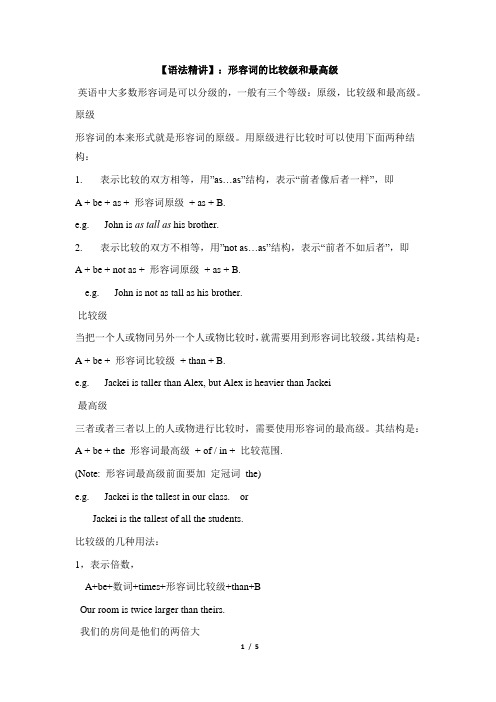
【语法精讲】:形容词的比较级和最高级英语中大多数形容词是可以分级的,一般有三个等级:原级,比较级和最高级。
原级形容词的本来形式就是形容词的原级。
用原级进行比较时可以使用下面两种结构:1. 表示比较的双方相等,用”as…as”结构,表示“前者像后者一样”,即A + be + as + 形容词原级+ as + B.e.g. John is as tall as his brother.2. 表示比较的双方不相等,用”not as…as”结构,表示“前者不如后者”,即A + be + not as + 形容词原级+ as + B.e.g. John is not as tall as his brother.比较级当把一个人或物同另外一个人或物比较时,就需要用到形容词比较级。
其结构是:A + be + 形容词比较级+ than + B.e.g. Jackei is taller than Alex, but Alex is heavier than Jackei最高级三者或者三者以上的人或物进行比较时,需要使用形容词的最高级。
其结构是:A + be + the 形容词最高级+ of / in + 比较范围.(Note: 形容词最高级前面要加定冠词the)e.g. Jackei is the tallest in our class. orJackei is the tallest of all the students.比较级的几种用法:1,表示倍数,A+be+数词+times+形容词比较级+than+BOur room is twice larger than theirs.我们的房间是他们的两倍大注:两倍为twice而不是two times.2,表示大多少,多多少,高多少等A+be+数量词+比较级+than+BShe is two years older than me她比我大两岁3,用比较级表示最高级A+be+比较级+than+any other+单数名词,或者,A+be+比较级+than+the other+复数名词He is taller than any other student in the class.他比班上其他的同学都高。
英语 形容词 副词 比较级和最高级 用法 讲解 知识点总结 完整版 最全 归纳 专项

同级、比较级和最高级概述:今天比较热。
→【误】It is hotter today.【正】It is rather hot today.【正】It is hotter today than yesterday.没有任何前提或者范围的比较都是不成立的。
一、同级比较同级比较用于两者之间,有以下两种情况:1. 肯定形式的同级比较:表示一方像另一方那样…结构:(句子)as + a./ad. (原级) + as 名词或主格代词e.g. Some of the stars might be as large as the sun and as hot as the sun. 星球中也许有一些和太阳一样大,与太阳的温度一样高。
2. 否定形式的同级比较:表示一方不如另一方那样…结构:not as/ so + a./ ad.(原级) + as 名词或主格代词e.g. The melting point of copper is not so/ as high as that of iron.注意:not so much… as…的结构表示与其说…不如说…e.g. Successful implementation of Channel Management is not so much as a question of supporting as many functions as possible using software, as of identifying the core areas and processes critical for business in a particular industry, and concentrating efforts there.成功的实施渠道管理与其说是一个运用软件支持尽量多业务功能的问题,不如说是一个发现某个特定行业的核心业务范围和关键业务流程的问题。
注解:这句虽长但实际上是单句,不是复合句。
英语初中-形容词的比较级、最高级-讲解及习题(含答案)
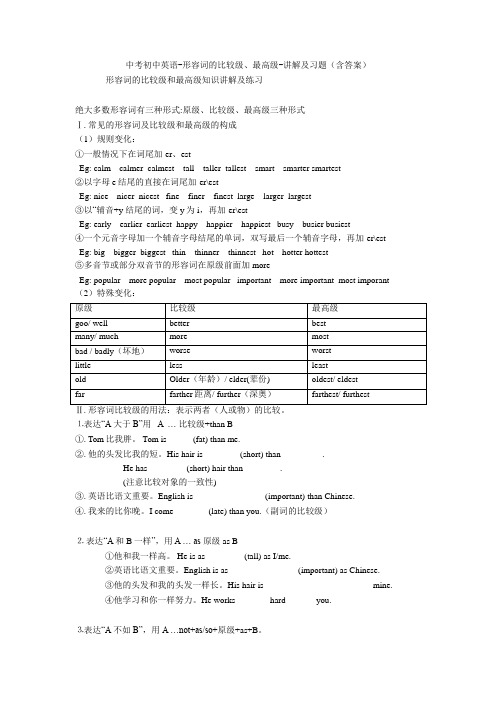
中考初中英语-形容词的比较级、最高级-讲解及习题(含答案)形容词的比较级和最高级知识讲解及练习绝大多数形容词有三种形式:原级、比较级、最高级三种形式Ⅰ. 常见的形容词及比较级和最高级的构成(1)规则变化:①一般情况下在词尾加-er、estEg: calm---calmer calmest tall---taller tallest smart---smarter smartest②以字母e结尾的直接在词尾加-er\estEg: nice---nicer nicest fine---finer finest large---larger largest③以“辅音+y 结尾的词,变y为 i,再加-er\estEg: early---earlier earliest happy---happier happiest busy---busier busiest④一个元音字母加一个辅音字母结尾的单词,双写最后一个辅音字母,再加-er\est Eg: big---bigger biggest thin---thinner thinnest hot---hotter hottest⑤多音节或部分双音节的形容词在原级前面加moreEg: popular---more popular most popular important---more important most imporant (2)特殊变化:⒈表达“A大于B”用 A … 比较级+than B①. Tom比我胖。
Tom is _____ (fat) than me.②. 他的头发比我的短。
His hair is ________(short) than _________.He has ________ (short) hair than ________.(注意比较对象的一致性)③. 英语比语文重要。
English is _______________ (important) than Chinese.④. 我来的比你晚。
英语比较级和最高级的用法归纳
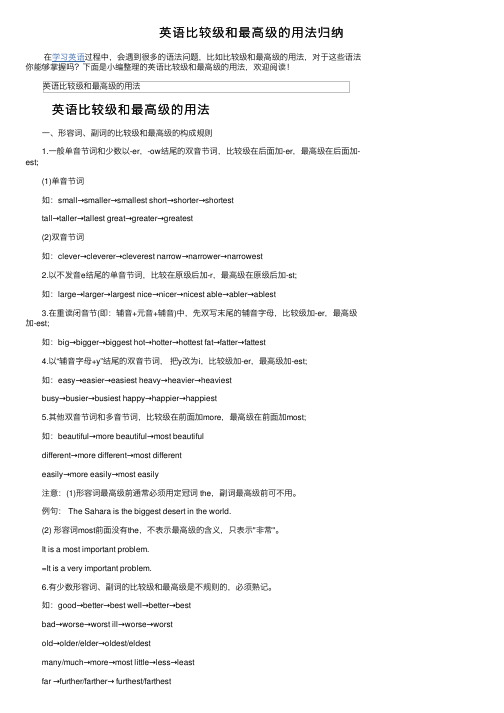
英语⽐较级和最⾼级的⽤法归纳 在学习英语过程中,会遇到很多的语法问题,⽐如⽐较级和最⾼级的⽤法,对于这些语法你能够掌握吗?下⾯是⼩编整理的英语⽐较级和最⾼级的⽤法,欢迎阅读!英语⽐较级和最⾼级的⽤法 英语⽐较级和最⾼级的⽤法 ⼀、形容词、副词的⽐较级和最⾼级的构成规则 1.⼀般单⾳节词和少数以-er,-ow结尾的双⾳节词,⽐较级在后⾯加-er,最⾼级在后⾯加-est; (1)单⾳节词 如:small→smaller→smallest short→shorter→shortest tall→taller→tallest great→greater→greatest (2)双⾳节词 如:clever→cleverer→cleverest narrow→narrower→narrowest 2.以不发⾳e结尾的单⾳节词,⽐较在原级后加-r,最⾼级在原级后加-st; 如:large→larger→largest nice→nicer→nicest able→abler→ablest 3.在重读闭⾳节(即:辅⾳+元⾳+辅⾳)中,先双写末尾的辅⾳字母,⽐较级加-er,最⾼级加-est; 如:big→bigger→biggest hot→hotter→hottest fat→fatter→fattest 4.以“辅⾳字母+y”结尾的双⾳节词,把y改为i,⽐较级加-er,最⾼级加-est; 如:easy→easier→easiest heavy→heavier→heaviest busy→busier→busiest happy→happier→happiest 5.其他双⾳节词和多⾳节词,⽐较级在前⾯加more,最⾼级在前⾯加most; 如:beautiful→more beautiful→most beautiful different→more different→most different easily→more easily→most easily 注意:(1)形容词最⾼级前通常必须⽤定冠词 the,副词最⾼级前可不⽤。
小升初英语语法专题精讲学案 形容词的比较级和最高级(含答案)

形容词的比拟级和最高级Start up1. Which house is bigger, your house or his house? 哪一个房子更大,你的房子还是他的房子?2. Summer is the hottest season in a year. 夏天是一年中最热的季节。
一、形容词的比拟等级大多数的形容词有三个等级:原级,比拟级,最高级。
原级就是形容词的原形,比拟级和最高级的词性有规那么与不规那么之分。
二、形容词的比拟级和最高级规那么变化构成法原级比拟级最高级1. 一般在词尾加-er或-est greatgreater the greatest2.以不发音的e结尾加-r或-st brave braver the bravest3. 以辅音字母结尾的重读闭音节,双写尾字母加-er或-est big bigger the biggest4. 辅音字母加y结尾,那么变y为i,再加-er或-est happy happier the happiest5. 双音节和多音节单词在前加more或the most difficult more difficult the most difficult不规那么变化原级比拟级最高级bad worse the worstgood/wellbetter the bestmany/much more the mostlittle/few less the farthest/ the furthestold older/elder the oldest/eldest用法总结〔1〕比拟级用于两者间的比拟,表示在两者中间一方比另一方“更加…〞;句子结构:A+be动词+形容词比拟级+than+B…eg: China is bigger than US.〔2〕最高级用于三者或三者以上的比拟;句子结构:A+be动词+the+形容词最高级+名词+表示范围的短语或从句(如all, of all, of the tree, in the world, that has ever taken place等)。
小学英语语法详解形容词--形容词的原级,比较级和最高级的用法
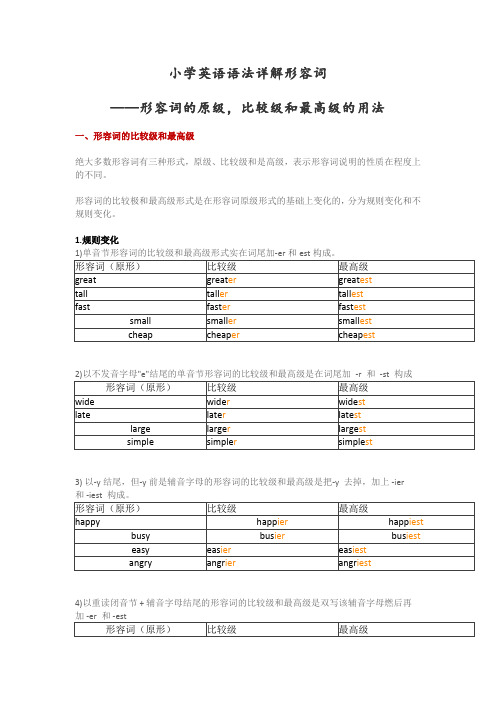
小学英语语法详解形容词——形容词的原级,比较级和最高级的用法一、形容词的比较级和最高级绝大多数形容词有三种形式,原级、比较级和是高级,表示形容词说明的性质在程度上的不同。
形容词的比较极和最高级形式是在形容词原级形式的基础上变化的,分为规则变化和不规则变化。
1.规则变化3) 以-y结尾,但-y前是辅音字母的形容词的比较级和最高级是把-y 去掉,加上 -ier4)以重读闭音节 + 辅音字母结尾的形容词的比较级和最高级是双写该辅音字母燃后再5)双音节和多音节形容词的比较级和最高级需用more和the most 加在形容词前面来Aaron老师的小提醒:★有些形容词的比较级和最高级,可以有两种表示法:clever—cleverer, cleverest 或者more clever, the most cleverfriendly—friendlier,friendliest 或者more friendly , the most friendly★形容词前如加less和least 则表示"较不"和"最不":important 重要,less important 较不重要,least important 最不重要。
二、形容词的原级,比较级和最高级的用法1.形容词的原级1)形容词的原级一般用在同级比较的情况较多,两个比较对象程度相同的,用“as + 形容词原级+as 的结构”Tom is as tall as his brothe.汤姆和他的哥哥一样高。
My hair is as long as hers.我的头发和她的一样长。
His shoes are as new as mine.他的鞋子和我的一样新。
在这两种结构中,第一个as是副词,而第二个as 是连词,一般后面接名词、代词或所有格。
2)如果表示“……不如……”则用“not so / as +形容词原级+as的结构”His bedroom is not as big as his sister's.他的房间不如他姐姐的大。
形容词的比较级和最高级

◇Look at the pictures and understand
big
bigger
◇Look at the pictures and understand
bigger
biggest
big
◇Look at the pictures and understand
fast faster
fastest
形容词的种类一般有:
(1) 简单的形容词有:good 好的,green 绿色的,long 长的,bright 明亮的
(2) 带有前缀a-的形容词: afraid 害怕的,alike 相同的, asleep 睡着的 (3) 由动词的分词构成的形容词: interesting 有兴趣的,exciting 令人兴奋的;tired 疲劳 的;spoiled 宠坏的
如:Tnger. 天正变得越来越长了。
Your sister becomes more and more beautiful. 你的妹妹变得越来越漂亮了。
(5) 当比较的双方属于同一范围内时候,用other或者else排除自己,因为 自己不能和自己比较。
7. The_______you work at your lessons, the _______ results you will get.
【2012 湖北黄石】
A. hard; good C. hard; better B. harder; good D. harder; better
8. — Do you know sound travels very fast? 【2012湖北荆州】 — Yes. But light travels A. as fast as C. much faster tha sound. B. a little faster than D. slower than
英语比较级和最高级的用法归纳

英语比较级和最高级的用法归纳英语中的形容词比较级和最高级是用来比较两个或多个事物的等级。
了解这些等级的用法对于正确使用比较级和最高级是非常重要的。
下面是关于比较级和最高级用法的详细归纳。
1.比较级的构成:在英语中,比较级的构成主要有以下几种形式:a) 在形容词的后面加上 -er 或者在前面加上 more,例如:bigger或者 more interesting;b) 在双音节和多音节形容词前面加上 more,例如:more beautiful;c) 一些特殊的形容词有自己的比较级形式,例如:good-better、bad-worse、far-further/farther。
2.最高级的构成:最高级的构成主要有以下几种形式:a) 在形容词的后面加上 -est 或在前面加上 most,例如:biggest或者 most interesting;b) 双音节和多音节形容词前面加上 most,例如:most beautiful;c) 一些特殊的形容词有自己的最高级形式,例如:good-best、bad-worst、far-furthest/farthest。
3.比较级的用法:a) 在比较级的句子中,被比较的两个事物之间需要用 than 连接,例如:He is taller than his brother.b) 当表示两个事物之间的比较时,通常比较级的形式是正确的选择,例如:The book is more interesting than the movie.c) 当表示比较级的范围时,可以使用连词比较级来形容范围的两个极端,例如:The weather is getting colder and colder.4.最高级的用法:a) 在最高级的句子中,需要明确表示参照物,通过使用介词形式来连接参照物与所比较的事物,例如:She is the tallest girl in the class.b) 最高级也可以用来表示一种特定的属性,而不是与其他事物进行比较,例如:It is the most beautiful place I've ever seen.c) 当表示最高级时,可以使用 only 或者 one of the + 最高级的形式来强调其独特性,例如:She is the only one of her friends who can play the piano.5.特殊用法和注意事项:a) 有些形容词的比较级和最高级形式是不规则的,需要特殊记忆,例如:good-better-best、bad-worse-worst、far-further/farther-furthest/farthest。
(完整版)高中英语的比较级和最高级用法总结
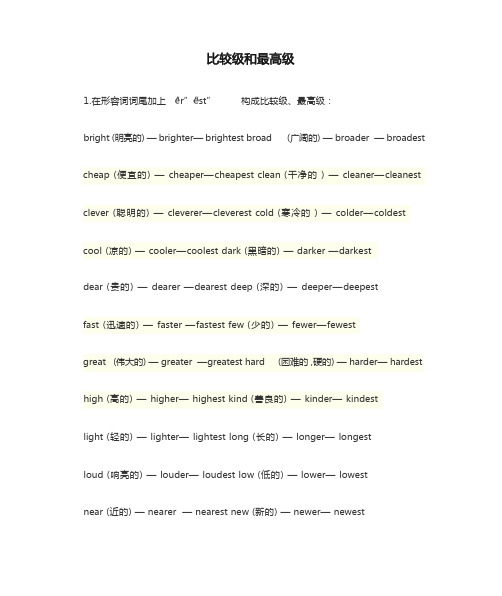
1.在形容词词尾加上r”st” 构成比较级、最高级:bright (明亮的) — brighter— brightest broad (广阔的) — broader — broadest cheap (便宜的) — cheaper—cheapest clean (干净的 ) — cleaner—cleanest clever (聪明的) — cleverer—cleverest cold (寒冷的 ) — colder—coldest cool (凉的) — cooler—coolest dark (黑暗的) — darker —darkestdear (贵的) — dearer —dearest deep (深的) — deeper—deepestfast (迅速的) — faster —fastest few (少的) — fewer—fewestgreat (伟大的) — greater —greatest hard (困难的 ,硬的) — harder— hardest high (高的) — higher— highest kind (善良的) — kinder— kindestlight (轻的) — lighter— lightest long (长的) — longer— longestloud (响亮的) — louder— loudest low (低的) — lower— lowestnear (近的) — nearer — nearest new (新的) — newer— newestpoor (穷的) — poorer — poorest quick (快的) — quicker —quickest quiet (安静的) — quieter—quietest rich (富裕的) — richer— richest short (短的) — shorter—shortest slow (慢的) — slower—slowestsmall (小的) — smaller—smallest smart (聪明的) — smarter—smartest soft (柔软的) — softer —softest strong (强壮的) — stronger—strongest sweet (甜的) — sweeter—sweetest tall (高的) -taller-tallestthick (厚的) — thicker —thickest warm (温暖的 ) — warmer—warmest weak (弱的) —weaker —weakest young (年轻的 ) — younger—youngest 2.双写最后一个字母,再加上r”st”构成比较级、最高级:big (大的) — bigger— biggest fat (胖的) — fatter—fattesthot (热的) — hotter— hottest red (红的) — redder — reddestsad (伤心的) — sadder—saddestthin (瘦的) — thinner—thinnest3.以不发音的字母 e 结尾的形容词,加上“r” “st” 构成比较级、最高级:able (能干的) — abler—ablest brave (勇敢的) — braver — bravestclose (接近的) — closer—closest fine (好的,完美的) — finer—finest large (巨大的) — larger — largest late (迟的) — later— latestnice (好的) — nicer— nicest ripe (成熟的) — riper— ripestrude (粗鲁的 ) — ruder— rudest safe (安全的) — safer—safeststrange (奇怪的) — stranger—strangest wide (宽广的) — wider—widest wise (睿智的 ,聪明的) —wiser—wisestwhite (白的)—whiter—whitest4.以字母 y 结尾的形容词 ,把 y 改为 i,再加上“er”st”构成比较级、最高级:busy (忙碌的) — busier— busiest dirty (脏的) — dirtier—dirtiestdry (干燥的 ) — drier—driest early (早的) — earlier—earliesteasy (容易的) — easier—easiest friendly (友好的) — friendlier—friendliest funny (好玩的) — funnier—funniest happy (开心的) — happier— happiest healthy (健康的) — healthier— healthiest heavy (重的) — heavier— heaviest hungry (饿的) — hungrier— hungriest lazy (懒惰的 ) — lazier— laziestlucky(幸运的) — luckier— luckiest naughty (调皮的) — naughtier— naughtiest noisy (嘈杂的) — noisier— noisiest pretty (美丽的) — prettier— prettiestsilly (傻的) — sillier—silliest spicy (辣的) — spicier—spiciestthirsty (渴的) — thirstier—thirstiest ugly (丑的) — uglier— ugliest5.双音节、多音节形容词 ,在单词前面加上m“ore”m“ost”构成比较级、最高级:afraid (害怕的) — more afraid— most afraidbeautiful (美丽的) — more beautiful — most beautifulcareful (仔细的) — more careful — most carefulcheerful (开心的) — more cheerful— most cheerfulcrowded (拥挤的) — more crowded — most crowdeddangerous (危险的) — more dangerous — most dangerous delicious (美味的) — more delicious — most deliciousdifficult (困难的) — more difficult — most difficultexciting (令人兴奋的) — more exciting — most exciting expensive (昂贵的) — more expensive — most expensivefamous (著名的) — more famous — most famousfrightened (受惊的) — more frightened — most frightened frightening (令人害怕的) — more frightening — most frightening hard-working (勤奋的) — more hard-working — most hard-working helpful (有帮助的) — more helpful — most helpfulhonest (诚实的) — more honest — most honestimportant (重要的) — more important — most important interesting (有趣的) — more interesting — most interesting polite (有礼貌的 ) — more polite — most politeterrible (可怕的) — more terrible — most terribletired (累的) — more tired — most tired6.不规则变化的形容词:bad (坏的) —worse—worstfar (远的) — farther—farthest (far—further—furthest)good (好的) — better— bestill (病的)—worse—worstlittle (少的) — less— leastmany (多的) — more — most much (多的) — more — mostold ( 年老的 ) — older—oldest ( old—elder—eldest) well ( 好的 ,身体好的 )— better— best原级用法: as +adj/adv. 的原级+ as , 否定式 (not) so…as…只能修饰原级的词, very ,quite ,so ,tooeg. The ruler is as long as that one.He sings as well as Jack.He doesn’t sing as(so) well as Jack.形容词比较级的用法:形容词的比较级用于两个人或事物的比较 , 结构形式如下:1. A + is/ am/ are + 形容词比较级 + than + BShe is taller than I.Tomis more athletic thanSam.It is _________________today than it was yesterday. 今天的天气比昨天暖和。
(名师整理)最新英语中考冲刺《形容词、副词的比较级和最高级》专题考点精讲

比较级的修饰语
much(得多), a lot(得多), far(远 比), a bit(有一点), a little(有一 点), slightly(略微)
1. English is much/a bit more important than French in the world. 在这个世界中,英语比法语重要得多/ 一点。
narrowest cleverest politest
比较级和最高级的构成法
类型 构成 法
其 它 前面 active
双音加
积极的
节 词 more, important 重
和 多 most
要的
音节
carefully 仔
词
细地
举例
more active
more important
more carefully
比较级和最高级的构成法(不规则)
1.Two heads are better than one. 三个臭皮匠赛过诸葛亮。
2.The best mirror is an old friend. 以人为镜可明得失。
3.Least talk, most work. 少说话,多做事。
4.More haste, less speed. 欲速则不达。
最高级 greatest largest
ablest easiest earliest simplest commonest quietest most difficult most beautiful most easily
比较级和最高级的构成法(不规则)
(完整版)英语比较级和最高级
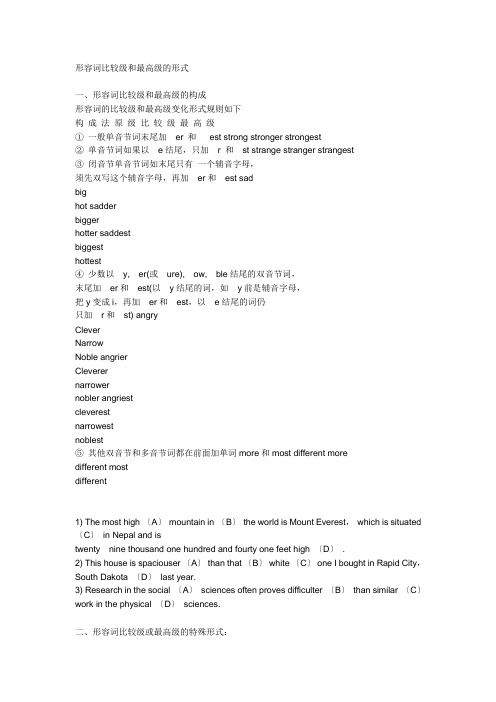
形容词比较级和最高级的形式一、形容词比较级和最高级的构成形容词的比较级和最高级变化形式规则如下构成法原级比较级最高级①一般单音节词末尾加er 和est strong stronger strongest②单音节词如果以e结尾,只加r 和st strange stranger strangest③闭音节单音节词如末尾只有一个辅音字母,须先双写这个辅音字母,再加er和est sadbighot sadderbiggerhotter saddestbiggesthottest④少数以y,er(或ure),ow,ble结尾的双音节词,末尾加er和est(以y结尾的词,如y前是辅音字母,把y变成i,再加er和est,以e结尾的词仍只加r和st) angryCleverNarrowNoble angrierCleverernarrowernobler angriestcleverestnarrowestnoblest⑤其他双音节和多音节词都在前面加单词more和most different moredifferent mostdifferent1) The most high 〔A〕mountain in 〔B〕the world is Mount Everest,which is situated 〔C〕in Nepal and istwenty nine thousand one hundred and fourty one feet high 〔D〕 .2) This house is spaciouser 〔A〕than that 〔B〕white 〔C〕one I bought in Rapid City,South Dakota 〔D〕last year.3) Research in the social 〔A〕sciences often proves difficulter 〔B〕than similar 〔C〕work in the physical 〔D〕sciences.二、形容词比较级或最高级的特殊形式:1. 三个或三个以上音节的形容词只能加more和most只能说more beautiful而不能说beautifuller; 只能说the most beautiful而不能说beautifullest。
初二上册英语知识点语法分析--形容词和副词比较级和最高级讲解
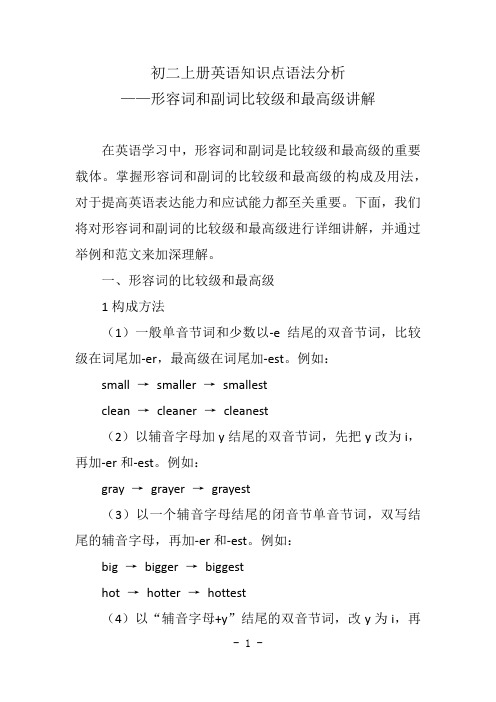
初二上册英语知识点语法分析——形容词和副词比较级和最高级讲解在英语学习中,形容词和副词是比较级和最高级的重要载体。
掌握形容词和副词的比较级和最高级的构成及用法,对于提高英语表达能力和应试能力都至关重要。
下面,我们将对形容词和副词的比较级和最高级进行详细讲解,并通过举例和范文来加深理解。
一、形容词的比较级和最高级1构成方法(1)一般单音节词和少数以-e结尾的双音节词,比较级在词尾加-er,最高级在词尾加-est。
例如:small →smaller →smallestclean →cleaner →cleanest(2)以辅音字母加y结尾的双音节词,先把y改为i,再加-er和-est。
例如:gray →grayer →grayest(3)以一个辅音字母结尾的闭音节单音节词,双写结尾的辅音字母,再加-er和-est。
例如:big →bigger →biggesthot →hotter →hottest(4)以“辅音字母+y”结尾的双音节词,改y为i,再加-er和-est。
例如:happy →happier →happiestheavy →heavier →heaviest(5)其他双音节词和多音节词,在词前加more和most。
例如:beautiful →more beautiful →most beautifulcarefully →more carefully →most carefully2用法(1)比较级用于两者之间的比较,常用句型为“A + be 动词+ 比较级+ than + B”,表示“A比B更……”。
例如:Tom is taller than Jack. (汤姆比杰克更高。
)(2)最高级用于三者或三者以上的比较,常用句型为“One of the + 最高级+ 名词复数”,表示“……是……中最……的之一”。
例如:She is one of the tallest girls in our class. (她是我们班最高的女孩之一。
初中英语知识点:比较级和最高级
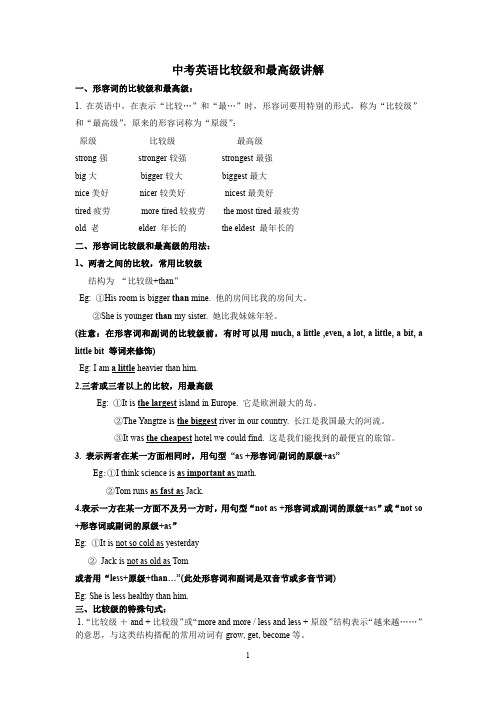
中考英语比较级和最高级讲解一、形容词的比较级和最高级:1.在英语中,在表示“比较…”和“最…”时,形容词要用特别的形式,称为“比较级”和“最高级”,原来的形容词称为“原级”:原级比较级最高级strong强stronger较强strongest最强big大bigger较大biggest最大nice美好nicer较美好nicest最美好tired疲劳more tired较疲劳the most tired最疲劳old老elder年长的the eldest最年长的二、形容词比较级和最高级的用法:1、两者之间的比较,常用比较级结构为“比较级+than”Eg:①His room is bigger than mine.他的房间比我的房间大。
②She is younger than my sister.她比我妹妹年轻。
(注意:在形容词和副词的比较级前,有时可以用much,a little,even,a lot,a little,a bit,a little bit等词来修饰)Eg:I am a little heavier than him.2.三者或三者以上的比较,用最高级Eg:①It is the largest island in Europe.它是欧洲最大的岛。
②The Yangtze is the biggest river in our country.长江是我国最大的河流。
③It was the cheapest hotel we could find.这是我们能找到的最便宜的旅馆。
3.表示两者在某一方面相同时,用句型“as+形容词/副词的原级+as”Eg:①I think science is as important as math.②Tom runs as fast as Jack.4.表示一方在某一方面不及另一方时,用句型“not as+形容词或副词的原级+as”或“not so +形容词或副词的原级+as”Eg:①It is not so cold as yesterday②Jack is not as old as Tom或者用“less+原级+than…”(此处形容词和副词是双音节或多音节词)Eg:She is less healthy than him.三、比较级的特殊句式:1.“比较级+and+比较级”或“more and more/less and less+原级”结构表示“越来越……”的意思,与这类结构搭配的常用动词有grow,get,become等。
形容词比较级和最高级
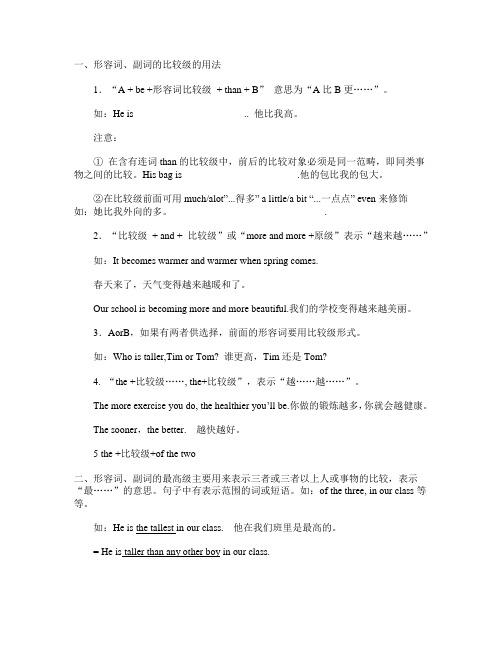
一、形容词、副词的比较级的用法1.“A + be +形容词比较级+ than + B”意思为“A比B更……”。
如:He is ______ _____ _______.. 他比我高。
注意:①在含有连词than的比较级中,前后的比较对象必须是同一范畴,即同类事物之间的比较。
His bag is ______ _______ ______.他的包比我的包大。
②在比较级前面可用much/alot”...得多” a little/a bit “...一点点” even来修饰如:她比我外向的多。
_______________________________.2.“比较级+ and + 比较级”或“more and more +原级”表示“越来越……”如:It becomes warmer and warmer when spring comes.春天来了,天气变得越来越暖和了。
Our school is becoming more and more beautiful.我们的学校变得越来越美丽。
3.AorB,如果有两者供选择,前面的形容词要用比较级形式。
如:Who is taller,Tim or Tom? 谁更高,Tim还是Tom?4. “the +比较级……, the+比较级”,表示“越……越……”。
The more exercise you do, the healthier you’ll be.你做的锻炼越多,你就会越健康。
The sooner,the better.越快越好。
5 the +比较级+of the two二、形容词、副词的最高级主要用来表示三者或三者以上人或事物的比较,表示“最……”的意思。
句子中有表示范围的词或短语。
如:of the three, in our class等等。
如:He is the tallest in our class.他在我们班里是最高的。
= He is taller than any other boy in our class.比较级和最高级练习题( ) 1. Most of the people in Guangdong are getting ________. A. more and more richB. more rich and more richC. richer and richerD. richer and richest ( ) 2. Which is ____,a bus, a car or a plane?A. the fastestB. most fastC. fastD. faster( ) 3. Li Hua’s English is very good, and her French __________ her English.A. is as good asB. isn’t as good asC. is as well asD. is as better as ( )4. Who’s _______ in your class?A.strongB.strongerC.strongestD.the strongest( )5.Jack is a little _____than Peter.A. strongB. strongerC. strongestD. the strongest( ) 6. Tokyo is larger than ____ in Japan.A. any other cityB. any cityC. the other city( )7. Remember this, children. ____ careful you are, ____ mistakes you will make.A.The more, the moreB. The more, the fewerC. The less, the less( )8. Which skirt is _______, the yellow one or the green one?A. expensiveB. very expensiveC. more expensiveD. most expensive ( ) 9. The Changjiang River is one of ________ in the world.A. the longest riverB. the longer riverC. the longest riversD. the longer rivers ( ) 10.The new pen is _____ than the old one.A. much goodB. more betterC.much better( )11.Your room is_____than theirs. Their room is _____than ours. Our room is _____of the three.A. bigger; bigger; smallerB. bigger; bigger; the smallestC. bigger; bigger; smallest ( ) 12.Shanghai is one of the _____ in the world.A. big cityB. biggest cityC. biggest cities( ) 14. When a piece of ice is taken into a warm room, it becomes ________.A. big and bigB. bigger and biggerC. small and smallD. smaller and smaller ( ) 15. A taxi doesn’t run as _____ as a train.A. fastB. fasterC. fastestD. more fast( ) 16. Which is ______, the moon or the earth? A. big B. bigger C. the biggest ( ) 17. My little brother sings ________ than other boys.A. beautifulB. more beautifulC. beautifullyD. more beautifully ( ) 18. Of all the students, she looks _____.A. the happiestB. the most happiestC. happier( ) 19. Which do you like _______ , tea or milk? A. well B. better C. very much ( ) 20. Who jumped _____ of all in the long jump? A. farthest B. longest C. farther21. Oldies 102.1 FM is ______ (bad) than All Talk 970 A.M.22. Tom is _____ than Wang Li. Wang Li is ____than Wang Fang. So Tom is ________ . (fat)23. Of all the students she is ___________ (clever).24. I think Town Cinema has the _______________ (friendly) service in the town.。
英语语法入门十八(形容词的比较级和最高级变化规则)
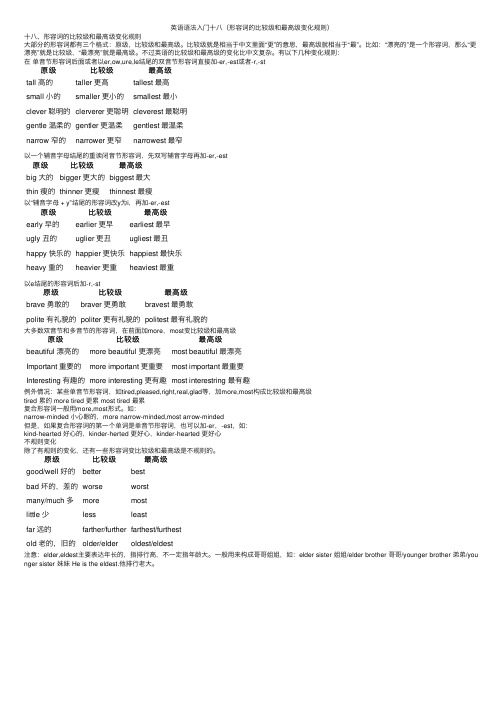
英语语法⼊门⼗⼋(形容词的⽐较级和最⾼级变化规则)⼗⼋、形容词的⽐较级和最⾼级变化规则⼤部分的形容词都有三个格式:原级,⽐较级和最⾼级。
⽐较级就是相当于中⽂⾥⾯“更”的意思,最⾼级就相当于“最”。
⽐如:“漂亮的”是⼀个形容词,那么“更漂亮”就是⽐较级,“最漂亮”就是最⾼级。
不过英语的⽐较级和最⾼级的变化⽐中⽂复杂。
有以下⼏种变化规则:在单⾳节形容词后⾯或者以er,ow,ure,le结尾的双⾳节形容词直接加-er,-est或者-r,-st原级⽐较级最⾼级tall ⾼的taller 更⾼tallest 最⾼small ⼩的smaller 更⼩的smallest 最⼩clever 聪明的clerverer 更聪明cleverest 最聪明gentle 温柔的gentler 更温柔gentlest 最温柔narrow 窄的narrower 更窄narrowest 最窄以⼀个辅⾳字母结尾的重读闭⾳节形容词,先双写辅⾳字母再加-er,-est原级⽐较级最⾼级big ⼤的bigger 更⼤的biggest 最⼤thin 瘦的thinner 更瘦thinnest 最瘦以“辅⾳字母 + y”结尾的形容词改y为i,再加-er,-est原级⽐较级最⾼级early 早的earlier 更早earliest 最早ugly 丑的uglier 更丑ugliest 最丑happy 快乐的happier 更快乐happiest 最快乐heavy 重的heavier 更重heaviest 最重以e结尾的形容词后加-r,-st原级⽐较级最⾼级brave 勇敢的braver 更勇敢bravest 最勇敢polite 有礼貌的politer 更有礼貌的politest 最有礼貌的⼤多数双⾳节和多⾳节的形容词,在前⾯加more,most变⽐较级和最⾼级原级⽐较级最⾼级beautiful 漂亮的more beautiful 更漂亮most beautiful 最漂亮Important 重要的more important 更重要most important 最重要Interesting 有趣的more interesting 更有趣most interestring 最有趣例外情况:某些单⾳节形容词,如tired,pleased,right,real,glad等,加more,most构成⽐较级和最⾼级tired 累的 more tired 更累 most tired 最累复合形容词⼀般⽤more,most形式。
- 1、下载文档前请自行甄别文档内容的完整性,平台不提供额外的编辑、内容补充、找答案等附加服务。
- 2、"仅部分预览"的文档,不可在线预览部分如存在完整性等问题,可反馈申请退款(可完整预览的文档不适用该条件!)。
- 3、如文档侵犯您的权益,请联系客服反馈,我们会尽快为您处理(人工客服工作时间:9:00-18:30)。
【英语】形容词的比较级和最高级知识点(精讲)
大多数形容词和副词有比较级和最高级的变化,即原级、比较级和最高级,用来表示事物的等级差别。
原级即形容词的原形,比较级和最高级有规则变化和不规则变化两种。
(1)单音节词加词尾-er,-est来构成比较级和最高级。
tall(高的)taller tallest
great(巨大的)greater greatest
(2)以不发音的e结尾的单音节词只加-r,-st
nice(好的)nicer nicest
large(大的)larger largest
able(有能力的)abler ablest
(3)以一个辅音字母结尾的闭音节单音节词,双写结尾的辅音字母,再加-er,-est
big(大的)bigger biggest
hot热的)hotter hottest
red红色的redder reddest
(4)"以辅音字母+y"结尾的双音节词,改y为i,再加-er,-est
easy(容易的)easier easiest
busy(忙的)busier busiest
(5)以ly结尾的副词,除early-earlier-earliest,其他都是加more most.
Slowly-more slowly-most slowly
Bravely-more bravely-most bravely
quickly-more quickly-most quickly
(6)少数以-er,-ow结尾的双音节词未尾加-er,-est
clever(聪明的)cleverer cleverest
narrow(窄的)narrower narrowest
(7)其他双音节词和多音节词在前面加more,most来构成比较级和最高级。
如:important(重要的)more important most important
easily(容易地)more easily most easily
(8)一些词的比较级和最高级,可以加-er或-est,也可以加more或most
如:clever,polite等。
(9)不规则变化
good/well→better→best
bad/ill/badly→worse→worst
many/much→more→most
little→less→least
far→farther→farthest(表示距离)/far→further→furthest(表示程度)
old→older/elder→oldest(表示新旧或年龄)/eldest(表示兄弟姐妹之间的长幼关系)
副词的比较级和最高级的构成规则和形容词比较级和最高级的构成规则一样,所不同的是:形容词最高级前面必须用the,而副词的最高级前面的the可带可不带。
一些词本身没有比较级和最高级形式,如:right,wrong,full,empty,round, complete,wooden,dead,daily等。
long-longer-longest
young-younger-youngest
old-older/elder-oldest/eldest
short-shorter-shortest
high-higher-highest
deep-deeper-deepest small-smaller-smallest big-bigger-biggest
tall-taller-tallest
loud-louder-loudest
low-lower-lowest
thin-thinner-thinnest fat-fatter-fattest
great-greater-greatest nice-nicer-nicest happy-happier-happiest heavy-heavier-heaviest cheap-cheaper-cheapest near-nearer-nearest clean-cleaner-cleanest few-fewer-fewest
late-later-latest
angry-angrier-angriest busy-busier-busiest lazy-lazier-laziest
hot-hotter-hottest
glad-gladder-gladdest
clear-clearer-clearest
strong-stronger-strongest
lucky-luckier-luckiest
interesting-moreinteresting-most interesting
difficult-more difficult-most difficult
expensive-more expensive-most expensive
形容词比较级的用法
1.两者比较时用形容词比较级,其结构为“...比较级+than...”。
如:Actions speak louder than words.
2.在两者之间选择“哪一个更……”时,用句型“Which/Who is+比较级,...or...?”。
如:Which sweater is cheaper,the red one or the yellow one?
3.表示“两者之间最……的一个”时,用“the+比较级”。
如:Lucy is the taller of the twins.
4.表示“越……,越……”时,用“the+比较级,the+比较级”。
如:The more you eat, the fatter you will become.
5.表示“越来越……”时,用“比较级+and+比较级”,多音节词和部分双音节词用“more and more+形容词原级”。
如:We should make our country more and more beautiful.
6.形容词比较级前可以用下列词修饰:much,a little,far,a bit,a few,a lot,even, still,rather等。
如:It's much colder today than yesterday.
1.三者或三者以上的人或物进行比较时,用形容词最高级形式。
形容词最高级前通常需加定冠词the,句末常接in/of短语来表示范围。
如:He is the strongest of all the boys.
2.表示“最……之一”时,用“one of+the+最高级”。
如:The light bulb is one of the most helpful inventions.
3.形容词最高级前可以由物主代词、指示代词、名词所有格等修饰,此时不用定冠词the。
如:Yesterday is her happiest day in her life
修饰语
比较级的修饰语
Much(……得多),far(……得多),even(甚至,更),still(更),a bit(有点),a little(有点),a lot(很),a great deal(大大地),twice(两倍),five times(五倍),two-fifths(五分之二),a half(一半)等修饰比较级表示程度,但决不可用very修饰。
eg.Tom is a little taller than Mike.Tom比Mike稍高一点;
It is even colder today than yesterday.今天甚至比昨天更冷
By far/far and away最,很much……得多almost几乎nearly几乎
另外,second,third,next等也要放在定冠词之后。
如:
The Yellow River is the second longest in China.
黄河是中国的第二大河。
This is the third largest building in this city.
The Yellow River is the second longest river in China.
This is(by)far the best book that I've ever read.。
